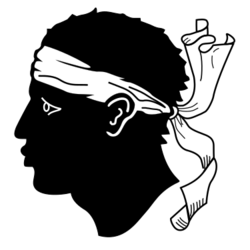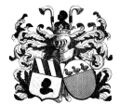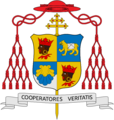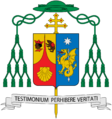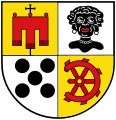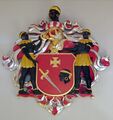Moor's head (heraldry)
A Moor's head, since the 11th century, is a symbol depicting the head of a black moor.
Origin
The precise origin of the Moor's head is a subject of controversy. But the most likely explanation is that it is derived from the heraldic war flag of the Reconquista depicting the Cross of Alcoraz, symbolizing Peter I of Aragon and Pamplona's victory over the "Moorish" kings of the Taifa of Zaragoza in the Battle of Alcoraz in 1096. The blindfold may originally have been a headband.[1]
Another theory claims that it is the Nubian Saint Maurice (3rd century AD).[2]
The earliest heraldic use of the Moor's head is first recorded in 1281, during the reign of Peter III of Aragon and represents the Cross of Alcoraz, which the King adopted as his personal coat of arms.[3] The Crown of Aragon had for a long time governed Sardinia and Corsica, having been granted the islands by the Pope, although they never really exercised formal control. The Moor's head became a symbol of the islands.[4]
Flags, seals, and emblems
This symbol is used in heraldry, vexillography, and political imagery.
Flag of Corsica
The main charge in the coat of arms in Corsica is a U Moru, Corsican for "The Moor". An early version is attested in the 14th-century Gelre Armorial, where an unblindfolded Moor's head represents Corsica as a state of the Crown of Aragon. Interestingly, the Moor's head is attached to his shoulders and upper body, and he is alive and smiling. In 1736, it was used by both sides during the struggle for independence.
In 1760, General Pasquale Paoli ordered the necklace to be removed from the head and the blindfold raised. His reason, reported by his biographers, was "Les Corses veulent y voir clair. La liberté doit marcher au flambeau de la philosophie. Ne dirait-on pas que nous craignons la lumière ?" (English: "The Corsicans want to see clearly. Freedom must walk by the torch of philosophy. Won't they say that we fear the light?") The blindfold was thereafter changed to a headband.
The current flag of Corsica is the Template:Lang-co), is male rather than female, and has a regular knot at the back of the head.
Flag of Sardinia
The flag of Sardinia is informally known as the Four Moors (Italian: I quattro mori, Template:Lang-src, Template:Lang-sro) and comprises four Moor heads.
African Unification Front
The "Maure" is the African Unification Front's flag and emblem. The head is blindfolded representing the impartiality of justice, and the knot is tied into a stylized Adinkra symbol for omnipotence (Gye Nyame).[5]
Modern controversy
Modern anti-racism efforts, coupled with increased African immigration to Europe and a growth of the Afro-European population, have led to controversies around ancient "Moor's head" symbols.[6] For example, the Austrian company Mohrenbrauerei was asked to remove the "Moor's head" from its bottles.[7]
Gallery
Coat of arms of Alcanadre. La Rioja, Spain, depicting heads of slain Muslims after the Reconquista
Coat of Avenches, Switzerland
Female Moor's head on the coat of arms of the district of Möhringen in Stuttgart, Germany[8]
Coat of the Kingdom of the Algarve, within Portugal
See also
- Blackamoor (decorative arts)
- Heads in heraldry
- Turk head (heraldry)
- Cross of Alcoraz
References
- ↑ "Corsica (France, Traditional province)". https://www.crwflags.com/fotw/flags/fr-co.html.
- ↑ "Flag of Corsica". February 17, 2015. https://www.traghettiper-corsica.it/en/tp-magazine/flag-of-corsica/.
- ↑ ""Moor's head" Peter aragon - Google Search". https://www.google.com/search?tbm=bks&q=%22Moor%27s+head%22+Peter+aragon.
- ↑ Martone, Eric (December 8, 2008). Encyclopedia of Blacks in European History and Culture [2 volumes]. ABC-CLIO. ISBN 9780313344497. https://books.google.com/books?id=8pFxDwAAQBAJ&q=%22Moor%27s+head%22+Peter+aragon&pg=PA356.
- ↑ "African Unification Front Flags & Emblems". Africanfront.org. http://www.africanfront.org/praetorium5.php.
- ↑ "Is the emblem of a Bern guild racist?". https://www.swissinfo.ch/eng/a-monument-to-debate_is-the-emblem-of-a-bern-guild-racist-/38740706.
- ↑ "Racism in a beer logo (2012)". April 25, 2016. https://blackcentraleurope.com/sources/1989-today/racism-in-a-beer-logo-2012/.
- ↑ "Möhringen (Stuttgart) - Wappen von Möhringen (Stuttgart) (Coat of arms (crest) of Möhringen (Stuttgart))". http://www.ngw.nl/heraldrywiki/index.php?title=Möhringen_(Stuttgart).
Further reading
- "Revisiting the Symbology of Europe's Moorish Heraldry". Black Research Central. https://www.blackresearchcentral.com/articles/revisiting-the-symbology-of-europes-moorish-heraldry.
- Fierro, Maribel (2008). "Decapitation of Christians and Muslims in the medieval Iberian Peninsula: Narrative, images, contemporary perceptions". Comparative Literature Studies 45 (2): 137–164. doi:10.1353/cls.0.0020. http://www.jstor.org/stable/25659647. Retrieved April 21, 2021.
- "Heart of Independent Sardinia". giampiero6's Orgosolo Page. http://members.virtualtourist.com/m/da2b/23e51/.
- "Sa Bandela de Sos Bator Moros", Sardinian Autonomous Region, http://www.sitos.regione.sardegna.it/4mori/4mori_sardo.htm, retrieved April 22, 2005 which in turn cites
- B. Fois (1990). Lo stemma dei quattro mori, breve storia dell'emblema dei Sardi. (editor Carlo Delfino) Sassari.
- "L'Histoire d'U Moru", Extraits de l'Ouvrage: "Trois Etudes Sur Paoli", http://perso.wanadoo.fr/bludimare/maure.htm, retrieved April 22, 2005
- "U Moru (English translation)", Extracts from "Trois Etudes Sur Paoli", http://perso.wanadoo.fr/bludimare/maurang.htm, retrieved April 22, 2005
External links
